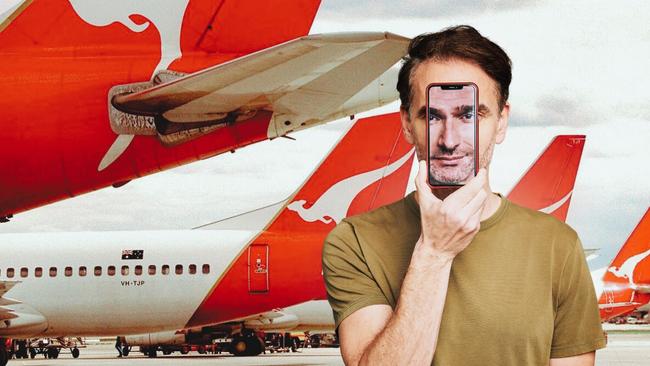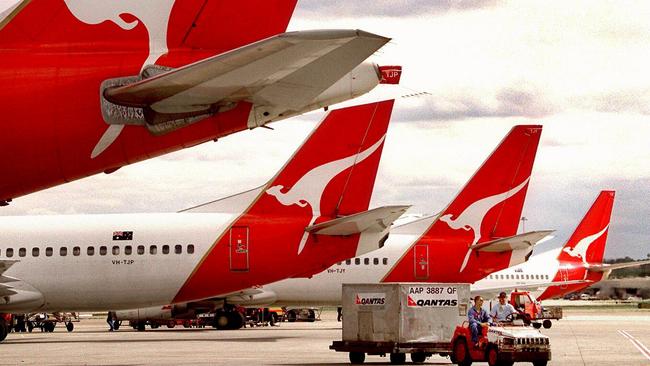Qantas woes expose Todd Sampson to new pressures
Brand guru and Qantas director Todd Sampson finds himself in the spotlight as the airline’s shareholders sharpen their knives for this week’s AGM.

Very few directors of Australian listed companies take their shirts off for magazine covers. This is probably for the best.
But Qantas director Todd Sampson is cut from a different cloth. The 53-year-old, best known as the brand guru television host of ABC’s The Gruen Transfer and Redesign My Brain, was very happy in 2015 to show off washboard abs and a timber wolf tattoo on his shoulder for a magazine cover.
Now unfortunately for him, he’s standing out because shareholders and investors have had enough of the Qantas board. They want blood and Sampson and fellow non-executive director Belinda Hutchinson happen to be the ones needing to stand for re-election at this week’s annual general meeting.
Sampson is the one specifically in the spotlight – with the likes of the Future Fund preparing to vote against his re-election – because he is the “brand man” and Qantas has done a remarkable job of destroying its own brand over the past 18 months.
“I’ve seen a few knives out for him but I’m not sure it’s fair because we just don’t know what goes on behind closed doors,” says brand expert Mike Wilson, who chairs media agency Hatched. “Any brand issues they’ve got are as a consequence of issues that have occurred in other areas of the business. It seems a long bow to have a go at Todd because he is the best-known public guy.”
It’s a key point and one that seems to have been lost in the quest for blame, now former chief executive Alan Joyce has taken early leave and disappeared from the spotlight and teflon chairman Richard Goyder brought forward his own departure.
The problems with the Qantas brand lie not with a lack of emotive creative campaigns, but instead on the operational side as it came out of lockdown; with its failures to customers through flight cancellations, appalling on-time performances, impossible to use flight credits, failure to answer phones, and lost bags – all served with record-high airfares.
The airline doubled down by illegally firing its baggage handlers (and then fighting the ruling all the way through the court system), allegedly selling tickets on flights that had already been cancelled, and successfully lobbying the government to block competition from staunch rival Qatar Airways. (Not that you can blame it for trying: the problem there sits squarely with Canberra.)
“There is blood in the water,” says a former director at Virgin who declined to be named. “There is a protest vote being registered and it’s not really about Todd, it’s about the board in general.”
Shareholders are right to be angry. Apart from the above mentioned operational debacles, the board signed off on the baggage handler decision and approved Joyce selling $17m in shares even though it had confidential information it was being investigated by the competition regulator for selling airfares on so-called ghost flights.
As the former director points out, who on the board was looking at how the company’s behaviour would look in the broader community?

“There needs to be a role on the board that considers broader stakeholder representation,” says the former Virgin director. “The High Court decision about the baggage handlers was scathing. Who was looking through the lens of how employees are treated. What’s the unintended consequence here?”
The Qantas board had no doubt become compliant. Joyce had been chief executive for too long – 15 years – and led the airline through difficult times, from the Global Financial Crisis, to self-grounding in the midst of a union dispute, and then the Covid pandemic. He came out of those things to produce a record $2.47bn profit last year and so the board, and Goyder in particular, allowed him to just get on with the job.
“The best CEO in Australia by a length of a straight,” was how Goyder described him last year, not long after Joyce had blamed passengers for “not being match fit” in defence of the hours-long queues of people trying to catch flights.
It’s difficult to know exactly what the non-executive directors could have done to change the approach of the CEO or chairman, but none of them called for them to leave earlier than they both individually decided.
One key positive Sampson did make was in seeing that Qantas should see itself as a loyalty business, not just an airline taking passengers from point to point, says one Qantas board member who would not be named.
“He was the first to really take this idea and see how important Loyalty could become,” says the board member. Maxine Brenner was the other big backer of outgoing executive Olivia Wirth’s highly profitable expansion of the frequent flyer unit.
A senior executive who sometimes attends board meetings says Sampson was also the main person to be challenging when it came to the voice of the customer and views on customer sentiment.
“He is the odd man out when it comes to the board, but maybe they should have been listening to him a bit more,” says the executive, who believes Sampson may face an undercurrent of snobbery from some board members who didn’t take the adman’s views seriously. This is an important point. There are few on listed-company boards with a strong advertising background, despite brand often being one of a company’s most valuable assets.
Sampson’s first public board role was at Fairfax, now owned by Nine Entertainment.
One former Fairfax director says it was hard to compare Sampson to any other board members because “if there is anyone else with that expertise at a board level, I haven’t come across them.”
Whether there should be that level of expertise is another question again. The former fellow Fairfax director says the trend that saw Sampson appointed has moved on: “There was this sense at the time that basically boards were made up of ex-finance guys who were a bit clubby so there was a call to broaden expertise, but then it got taken over by the push for gender and cultural diversity.”
His views of Sampson from his time at Fairfax was that he seemed “fine”, adding that normally for non-executive directors there was not a lot of room for defining moments.
“The reality of a boardroom dynamic is that it’s usually the chief executive and the chairman. They try to control the outcome of the board by agreeing on the essential questions before the meeting begins,” the former Fairfax director said.
Over at the Qantas board, Jacqueline Hey and Brenner have already announced they will leave, which along with Goyder and Joyce’s early departures make four quick exits.
Kerry Schott, who sits on the board of AGL and consults companies on board practices, says while she cannot comment on the specifics of Sampson, too much turnover on a board can be a negative. “They are in a tricky position,” Schott says. “They are changing the board and, as a general statement, you don’t want everybody going out the door at once because you do lose a lot of corporate knowledge and history when you do that. It’s really quite destructive when that happens.
“We’ve probably all got different views about the chairman in particular, but he has flagged he’s going … the shareholder base is clearly quite active and talking to the board about all this. So I would say that if there’s any director left that they want to get rid of, they’ll be flagging it at the meeting.”
Sampson, who the former Fairfax director says regaled the older board members with tales of his tightrope-walking exploits, is about to find out.
As someone close to him says, “he’s feeling a different kind of pressure from this because he feels he can’t fight back.”






To join the conversation, please log in. Don't have an account? Register
Join the conversation, you are commenting as Logout